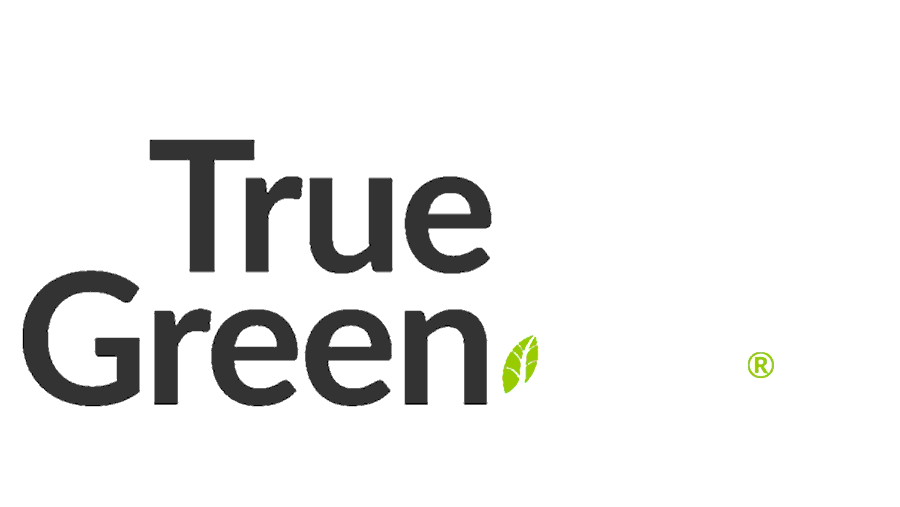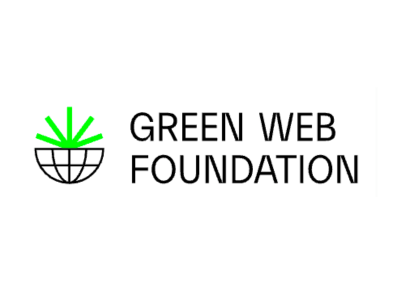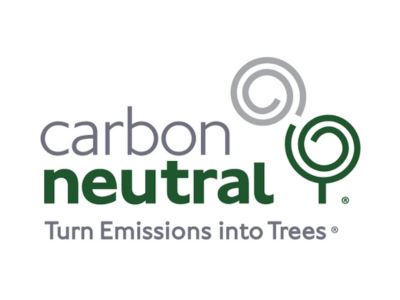If you’re reading this, we will go on a limb and assume you might be a business owner. Are we right? If you are, you’ll know perfectly well that you’ll be taking on some big projects you might not have worked on before.
One of the main ones will be creating a dedicated website to show your product or service to the world. These days, you simply can’t be without a website! And we know how big a task it is when you first get stuck in.
It’s common for our clients trying to get up and running online to feel overwhelmed. That’s OK! While you might want to look at fonts, content and branding, there’s something else you’ll need to consider first: your web hosting.
Finding the right Australian web hosting will depend on several factors and is one of the most important decisions you’ll make. Depending on your business, we’ll give you some pointers to help you choose the right web hosting in Australia and worldwide.
What is the right web hosting in Australia?
Before we get down to the nitty-gritty, it’s important that you understand the fundamentals of website hosting.
“Why do I need a web host?” Well, a web host’s most important function is allowing your audience to access your website! It’s like the address and physical spot your website lives at.
When people visit your website’s home page, that’s your front door, and all the other pages are the rooms in the home. Without a web host, your website will not exist on the World Wide Web. It’s an absolute must, but it’s one of those things people don’t often know much about when they’ve never had to create a website before.
A web host stores all the important files that make up your website’s walls, windows, and furniture in folders, which act as building blocks.
A web host then provides your website—your entire collection of files and folders—with a server. The server is the physical thing that all the 0s and 1s live in. Servers are also important in keeping your data secure so your website can function how you want it to.
These servers are essentially where your website is “hosted” (hence the term “web host”). When users search for your domain name, this connects to the host you have assigned your domain records. Then, their computer will connect to that server, and your website will be delivered to their computer for viewing!
While this is the basic function of web hosting, nowadays, a web host usually does more than that. Web hosting in Australia and around the world now includes an array of other functionalities that allow your website to perform well. This can range from securing your website to providing 24/7 tech support and tools to update your website plugins or software.
What’s the difference between a web host and a domain name?

You’ll need to know another bit of internet terminology: web hosting vs domain name. A web host and domain name are necessary for your website to exist online.
As mentioned, web hosting is a sophisticated storage system that makes your website accessible to your audience. Meanwhile, your audience will use a domain name to view your website. Otherwise, they’d be entering an internet protocol (IP) address with random numbers, and nobody wants that.
Put simply, a domain name is an address for your website, much like you have an address for your home or business. A web host is the building in which your website is stored. One cannot exist without the other!
A domain name is usually in the format of www.YourWebsiteName.com, with some variations depending on your type of business and geographical location. Take ours, for example – because we’re an Aussie business and website, our domain name ends in .au.
To secure a domain name for your website, you’ll need to:
- Make sure it’s available for use (you can search for available domain names here)
- Pay a yearly or recurring subscription fee to use it
It’s important to remember that a domain name only gets you an address. You’ll still need web hosting to build and publish your website online. Giving out a domain name without hosting is like giving out a random street address without having the keys to the property. It’s also worth noting that you’ll need to secure a domain name before you sort out your website hosting.
Please note that services like Squarespace, Shopify, Weebly, Wix and similar are hosting platforms themselves. You can’t purchase hosting separately for these services. However, you’ll still need to purchase a domain and decide where to run or host your emails.
How do web hosting services differ?
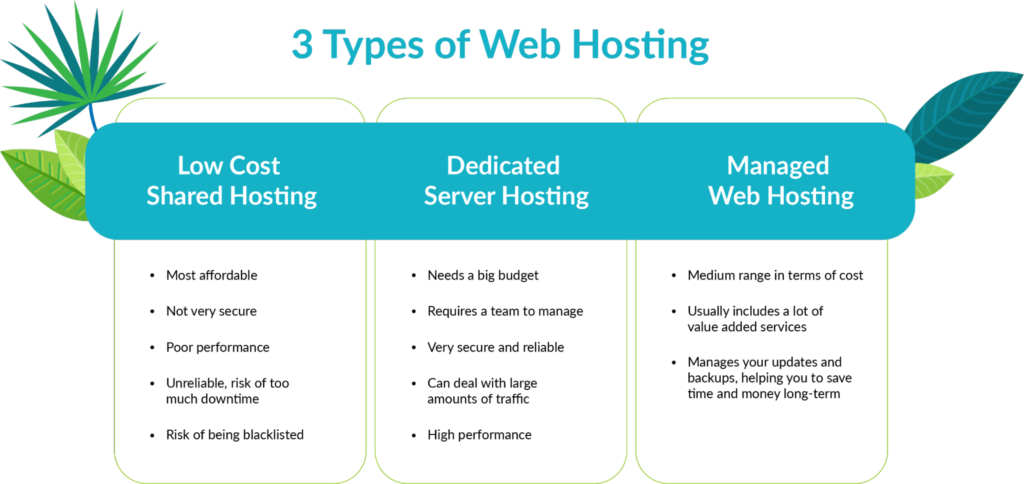
In keeping with our house analogy, in the same way that not all homes are built to the same standards or in the same way, not all web hosting services are created equal. There are three basic types of web hosting in Australia, and each one is different. You’ll need to determine which best suits your needs to find the right web hosting for your business.
1. Low cost shared hosting
These are the cheapest web hosts available. They share their server with many websites—like a house share, where you have your own room but live with other people (and their belongings) in the same dwelling. This type of web hosting might be okay for low-cost projects, but it’s not great for a business in the long term, no matter the size of your operations.
Due to their setup, this type of hosting poses many risks for a business, including:
- Slow site load time due to too much usage.
- Poor performance and reliability.
- Risk of getting blocklisted due to viruses on other accounts if web hosts don’t keep them separated (spoiler alert: they usually don’t).
If you have any important data, this is not a good option. Important data here, in particular, means things like people’s email addresses, contact details, or credit card information.
2. Dedicated server hosting
This type of web hosting is where the server hosts only your website and no one else’s, which means it doesn’t get limited in terms of performance. Dedicated server hosting is definitely a lot more secure than low cost shared hosting. Here, your website lives in its own home with no housemates. This results in a much more powerful website that can handle a lot of traffic and perform well.
Sometimes, this is also called VPS hosting (Virtual Private Server), where a dedicated space is created for your website files and resources. It’s common with resellers who want to provide hosting to their clients.
However, this is also a more costly option, mainly because you need to hire a server engineer or have a managed plan to run and check the server. It’s a good option for larger businesses with a budget that can be dedicated to it, but it’s probably not the best option for small businesses on a limited budget.
We provide customised dedicated server managed plans based on individual needs, you can contact us to tell us what you need and we’ll provide a quote for you.
3. Managed hosting
This type of hosting provides additional features that help to grow your business. For example, here at True Green®, we provide you with a tool that lets you update plugins and your WordPress software nightly (with the option to toggle on and off the automated task), extra security services, and 24/7 support (amongst plenty of other bells and whistles!).
One of the many benefits of managed hosting is that you won’t have to worry about updating and maintaining your server – your web host does this for you. This saves you a lot of time and headaches and allows you to focus instead on growing your business!
Most of the options above use cPanel hosting. It’s a backend that allows access to your website files and software. This is handy if your website goes down or a developer needs to work on the site without impacting the live environment. Another common platform is Plesk (owned by the same company).
How to choose the right web hosting in Australia

There are a few important things to consider when choosing the right website hosting for your small business. Use this handy guide to help you through the process!
Remember, every business is unique, so every website has different needs. So, when you’re doing your research, make sure you keep your specific goals and objectives in mind.
1. Server reliability
The most important factor in choosing the right web hosting company is their servers’ reliability. Everything from outdated hardware to connectivity issues can negatively affect your website. More specifically, it may result in your website going offline too often! Obviously, this isn’t a great thing for any website, but this can lead to losing out on valuable traffic and revenue for a business website.
A great way to look into a web hosting company’s server reliability is to enquire about its uptime scores over time. Hosting uptime refers to the amount of time that your website is online. Anything other than that is downtime when your website is completely inaccessible. When it comes to uptime scores, companies with scores of 99% annually are considered reliable. In general, we don’t recommend considering companies with scores below that.
If you already have a website and are shopping for a new web hosting company, you can do your own research to find another option. Tools like Host Tracker, Monitor Scout, and Service Uptime can help you examine your website’s uptime and downtime and compare it to the performance of the potential web hosting companies on your list.
2. Credibility and reputation
This is an important factor in any business. After all, why would you want to work with a supplier that might have a dubious reputation? Your web hosting company is no different and should operate to an honest, ethical, and customer-focused standard. Choose wisely and look at your options carefully, and you’ll save yourself time and stress in the future.
A great way to assess a company’s reputation is to examine its social media presence. Are many dissatisfied customers leaving comments on their posts? Have people left reviews on the web about their experiences with this web host? Alternatively, do they not have any reviews at all?
Another important factor when gauging a company’s credibility is its customer service. It’s imperative that you look for companies that promise 24/7 customer service. They should also be available to contact through multiple channels, like emails and phone calls. Again, reviews and testimonials from their existing customers can provide valuable insight.
You can also tell how much the company values its customers by how quickly and accurately your initial queries are answered. We always recommend communicating directly with a potential web host to determine whether they’re the right web hosting in Australia for you!
3. Core values
More small business owners in Australia and abroad are realising that they only want to work with companies that share their core values. No matter what your values are, it’s important that you hold your website hosting company to you and your company’s set of principles.
For example, most customers discover us because they want to live a more eco-friendly lifestyle. In turn, they also want service providers in Australia that share that same value. Our Green Web Hosting packages allow our client websites to reduce their carbon footprint, and we are committed to giving back to the community and the planet in various ways including our commitment to 1% for the Planet.
Our core values resonate with businesses that share our concern for sustainability and ethical business development. We love working with people who share our ethics, too, and we’re capable of helping you in ways you might not have thought of before. It might sound like we’re tooting our own horn, but we highlight it as a point of difference that sets us apart from our counterparts.
Based on their website and customer testimonials, you can quickly determine a web hosting provider’s core values. Make sure their values align with yours to avoid problems in the future!
4. Specialisation and areas of focus
Every web hosting company will have areas of expertise more suited to some websites than others. Some web hosts, like us, pride themselves on providing services that help small businesses and micro entrepreneurs. On the other hand, there are web hosting companies that focus fully on large corporations and conglomerates instead.
It’s important that you look into a web host’s existing customers and clients and see if these clients have enterprises of similar scale and complexity to yours. You can also look at their range of packages to gauge if they’re used to working with businesses of your size. If you’re hard-pressed to find one that suits you, they’re probably not the best choice for you when it comes to web hosting.
If you have an existing website, it may also be worth researching companies that specialise in the Content Management System (CMS) you’re using. This will help you avoid learning a completely new system when you transfer to a new web host! Reducing admin time this way is important and will save you money to keep things running smoothly.

5. Security
While there are many ways you can keep your website secure on your end, your web host is one of the most important factors impacting its level of security. Here are a few things we consider the bare minimum in terms of web hosting offerings—note that your chosen web host should provide all of these as part of their services.
Secure Sockets Layer (SSL certificate)
Also known as Transport Layer Security (TSL), this is a security protocol that encrypts the data on your website. It helps keep your website secure by showing meaningless symbols if someone tries to access your data. This certificate will show search engines like Google that your website is secure.
Backups
Frequent backups of your entire website will make it much easier and quicker to re-establish in case of a security breach. We recommend that you find a web hosting provider that performs daily backups.
Website updates
Your website will likely have plugins, apps, and software that require updating occasionally. Depending on how many of these you require, updating them can almost be a part-time job! A good web host with a managed plan will take on these updates for you or can help you navigate this space, keeping your website secure and fully functional while freeing up your time to focus on other aspects of your business.
Server maintenance
It’s also worth investigating whether web hosts back up and update their entire server frequently! This helps prevent data loss, connectivity issues, and potential weak points in server security. Server maintenance is vital to protect your data. You should ask your web host if they review their server setup and maintenance independently rather than only in-house (hint: we do).
6. User-friendliness of the backend interface
This is a factor that directly impacts how you’ll be able to run your website. Not all Content Management Systems or backend control panels are created equal. Some are far more complex than others and can take a bit of learning that you might not have time for!
As a business owner, you cannot escape from the fact that you’ll need to be able to do some basic website-related tasks every now and then. This can include creating new email accounts, installing a new plugin, or managing domain names. What we’re saying is to try to find a CMS that makes doing all those things as easy and pain-free as possible. You’ll thank yourself later.
At True Green, we’ve curated a simple and easy interface that you can figure out how to navigate without much (if any) experience. We have cPanel, WordPress, and other common Content Management Systems you’ll be able to get up and running faster than expected.
For those times when you’re too busy or need an extra helping hand, don’t worry about it. Why? We’ve got a 24/7 self-service dashboard to make accessing important features even easier. Our team can get you sorted and back on track at top speed.
7. Additional tools
As we mentioned before, nowadays, web hosting usually goes above and beyond simply hosting your website. Plenty of web hosts offer multiple tools to help you create a high-performing website for your business.
Here are a few additional tools we offer in our web hosting plans as part of our managed website solutions:
- Add Security Plus to your plan to access Sucuri Speed Optimiser and Content Delivery Network, which speeds up your site by connecting visitors to their closest server.
- Elementor Pro: a powerful WordPress website builder that makes it easy to design your website with drag-and-drop capabilities.
- Pro WordPress themes by Astra. These have a bunch of nifty templates for your website to take the hassle out of designing things yourself.
- Discounted plugins.
When your managed web hosting includes extras like tools and features, it’s important to consider how much value they add. For some context, our clients get access to numerous Pro versions of tools that would’ve cost them hundreds of dollars to purchase separately. It is quick, easy, and saves you dollars, too.
8. Scalability
We bet that over time, you’ll want your business to grow. So, when looking at a web host, you’ll want to choose something that provides you with room to expand. Things like increased traffic to your website or a higher sales volume can mean your original plan doesn’t cut it anymore. With that in mind, find the right web hosting in Australia to grow with you.
Will they allow you to upgrade your hosting plan when you need it? Is this something they cater for? Transferring to a new web host is a time-consuming process that should be avoided where possible, so find a web host that can scale its services to suit your needs as your business grows.
9. Budget
An obvious one that we can’t ignore is the cost of web hosting. The average amount you can expect to pay in Australia can range from under $50 to $1000 Aussie dollars a month, depending on all the factors mentioned above.
Generally, shared hosting suits the low-budget range, and managed web hosting suits medium budgets. If you’re looking at dedicated server hosting, that’ll set you back a lot more, starting at $400 Aussie dollars per month and ranging to the thousands.
Each web hosting company also usually offers different packages and add-ons that include offerings that appeal to businesses of different sizes and budgets.
For example, we have three web hosting plans to choose from. Which package you choose depends entirely on your specific needs, so don’t hesitate to contact us to discuss which of our packages best fits your needs.
Why you should separate your email hosting and your web hosting

While most web hosting providers include email addresses in their packages, we don’t recommend hosting your email on the same server or web host. Instead, we recommend using a separate email hosting option like Green Email Hosting (powered by Axigen), Google Workspace, or Microsoft 365. How come? There are a few good reasons:
- You can access emails even when your website server is down.
Your web host server will inevitably experience some occasional downtime or planned maintenance. Having separate email hosting means you can still access your emails when this happens. - Web host servers are geared towards websites, not emails.
Most web hosting servers aren’t as well equipped to manage emails as dedicated email hosting tools! It’s more of an add-on for them rather than their main focus. - It makes it easier for you to change web hosts if you need to.
If you need to transfer your website to another web host, it may be extremely difficult (and time-consuming) to transfer all your email data. If you cannot transfer it all, you might lose important data and information!
Common jargon of web hosts
At True Green, we have a saying: “Jargon is a naughty word”. But some technical terms regarding web hosting can’t be avoided! So, we’re here to walk you through some of the more common terms you’ll come across while searching for the right web hosting in Australia.
‘A’ record: Used to define the address of a website. This can be used instead of nameservers if you are setting up separate destinations to pinpoint where your site, email hosting, and different services may link or operate from.
Backup: This is a must for every website or business! Things can go wrong; when they do, you want to know there is a way to fix the issue quickly. A backup means you can recall the version of your files before the issue happens. These are also crucial for when sites are discovered to have malware or plugin conflict issues. Look for a provider with daily backups at a minimum. Consider a multi-backup layer approach, e.g., use Updraft or similar in addition to your web host, especially if you run a lot of data through your site.
Bandwidth: Is how much data can be transferred from the server to your website visitor. Think of it as a pipe letting water through. The longer or wider the pipe (bandwidth), the more water (data) can pass through and be delivered to the end bucket (user).
BIMI: Brand Indicators for Message Identification allows fully verified businesses to add their logo to a user’s email inbox. This helps a person see if an email is legitimate before they click open. Google currently restricts this feature to worldwide trade marked brands. Not all email programs support this method yet.
Caching: The server already holds the site files to load the content much faster. Many sites’ content does not change. Caching helps speed up the website load time by saving files and content before the user arrives. We use Litespeed cache, which you can flush in your cPanel. If you have Sucuri, you can clear the cache in the GROW dashboard.
CDN: Also known as a content delivery network (CDN), this is a multiple set of servers located around the globe that connect back to static files on your website to help them load faster if a person is further away from your primary server location.
CMS: A content management system (CMS) is an application that helps to make building or managing a website easier. The most common CMS is WordPress.org (self-hosted).
cPanel/Plesk: Also referred to as a Control Panel, it is an interface that visualises the different settings and options your web host server can perform. For example, file transfer protocol (FTP) allows others remote access to your server or website files via a secure connection. cPanel is also used to set up emails (do not recommend), SSL certificates, and to access other services or installation of software. Plesk is similar to cPanel but geared to Windows server setups.
CPU: The central processing unit (CPU) is the brain of your server. Like the human brain and how we communicate, a CPU fetches, decodes (translates), and executes (sends) different commands for the server or computer to perform. Many hosts monitor and limit CPU to avoid outages or overuse of their servers.
Data centre: A physical location that contains the servers your site is hosted on and is connected to the Internet. Typically powered by fossil fuels, data centres can consume a lot of energy if they do not use energy efficiency measures. That’s because servers typically run 24/7 and require a lot of lighting and cooling to keep them operating at a good level.
DDoS: A distributed denial of service (DDoS) attack is becoming more common worldwide. Essentially, it’s when someone tries to flood a server with large amounts of traffic for it to go down. Servers can manage a large amount of traffic passing through, but if a large, continuous, and unexpected flow continues, DDoS can occur. To get around this, firewalls are used to prevent known bad sources from causing issues on the site. In addition, these firewalls can help to detect those who are trying to cause issues for the network. However, they are not completely foolproof.
Disk space (storage): This is the amount of storage or room your files have on a server. The industry usually measures it in megabytes or gigabytes. It can contain your website content, images, emails, videos, plugins, and hosting account software.
DKIM: Domain Keys Identified Mail. This ensures the message you send is the same as those receiving it, preventing unwanted foul play as the communication goes in transit.
DMARC: Domain-based Message Authentication, Reporting & Conformance. This one uses your SPF and DKIM records to ensure no one is hacking the email or pretending to be you. You can also set how failures should be handled and assign an email for reports about who is sending emails successfully or not with your domain.
Domain Name Server (DNS): The domain name server translates an internet protocol, i.e. a series of numbers that forms an IP address. The nameserver is used to access or view a website easily. It would likely be very tricky to remember various IP addresses with random numbers.
Domain registrar: This is the company from which you purchased the domain (web address). You can find this information by looking up your domain at whois.com. It’s important to know that some information may be for a reseller or third party. So, it’s also a good idea to check your previous emails to identify your domain registrar. They are important, especially if your domain nameserver records are assigned to them to determine where your site or other services are appointed. You also want to ensure you renew your domain so you don’t lose it or find that someone else has bought it when it expires. There’s a large marketplace for purchasing expired domains, so plan ahead.
Firewall: Helps to protect your website from known bad visitors or individuals. It monitors and detects visitors to your website and decides whether to block or allow them to see your content or perform certain actions.
FTP/SFTP: A secure file transfer protocol (FTP/SFTP) is a way to transfer files. Developers commonly use it to send files to their remote server or computer to work on a site. FTP is then used to send those changes live by connecting back to your server. You would need an FTP application such as FileZilla and an FTP account (which can be created in your cPanel) to use FTP.
Gigabytes: This equals 1,024 megabytes, with the same meaning as megabytes answered further below.
ht access file: This enables or disables functionality offered by the Apache web server (web server software). For example, setting up rules around managing a page that does not exist (called a 404 error page or to stop Google Search Console crawling a page), advising password-protected content, or preventing other sites from linking to your images or videos. We encourage clients not to touch this as it’s highly technical. Best to contact your web host support team to manage any changes.
HTML: A hypertext markup language (HTML) used to code websites. It helps to define rules for your content, e.g. <b>text</b> will make the content bold.
HTTP: a hyper-text transfer protocol used to transfer content over the internet. The World Wide Web is essentially billions of interconnected hypertext documents.
You may see HTTP access codes when you visit a website such as:
– 301: A redirect that will take you to a new permanent location of the page or asset.
– 302: A temporary redirect for a file.
– 403: Forbidden message when you cannot view that file.
– 404: File or page not found.
– 500: Internal server error when there was an unexpected error in the server.
– 503: when there is a temporary issue with the server, e.g., the site has exceeded its bandwidth limits or is overloaded with too much traffic.
HTTPS: A secure hyper-text transfer protocol version of the flies. Hence, they are using an SSL certificate to use this rule.
Inode: An inode is like a special card for every file and folder on a computer. This card holds important details about the file or folder, such as its name, when it was created, who owns it, and where it’s stored on the computer.
IP Address: A string of numbers known as the internet protocol, e.g. 20.127.109.20, that points to a specific device or network. Every computer has an IP address, as do the websites you visit. The website IP address is masked by the domain name, e.g. website.com
Malware: Any software designed to damage your website or server. It comes in many forms, including worms, trojan horses, ransomware, spyware, and adware. Malware can be caused by vulnerabilities in your website, such as a weak password, an unscrupulous plugin, infection from a file on your computer or other devices, or a weakness in your server setup.
Megabytes: A unit of computer code. You can measure your disk space and bandwidth in this way.
MySQL: is a database management system called structured query language (SQL). The “My” is named after the co-founder’s daughter. It holds information such as order data for a WordPress website.
Parked domain: When a domain name has not been assigned to a web host or server or is offered to purchase via a reseller.
PHP: Scripting language (nicknamed personal home page (PHP). is used to build websites. PHP can be embedded into a site’s HTML code. It’s free, secure, flexible, and stable. It also helps to load sites a lot faster.
Propagation time: This is a common term, and we have tried to avoid using it to simplify the language around the hosting experience. It means the time it takes for changes to the domain nameserver records to take effect on the World Wide Web. The delay can range from 4 hours to 24 hours—and, in some cases, up to 48 hours.
RAM: Random access memory (RAM) is where your server stores short-term data so that you can quickly access information or content.
SLA: A service level agreement (SLA) is a promise or agreement a host makes to provide a service within a certain timeframe. For example, there may be an SLA for no more than 6 hours for technical support. SLAs are less common for non-enterprise hosting plans, especially large shared hosts, as their support can typically take a few days to get back to clients and will prioritise urgent queries over others.
SPF: Stands for Sender Policy Framework. This compares your Internet Protocol (IP) address sending an email and checks that you’re on the verified list to send it.
SSD: A solid-state drive (SSD) is a storage device used in computers or servers. It replaces hard disks by using a flash-based memory mechanism to improve a computer’s speed.
SSL certificate: A secure socket layer (SSL) certificate helps to secure data, ensuring no one else is interfering with it, and they cannot source the original contents. It uses encryption, cryptography, and padlock to keep data safe and secure. SSLs used to be for eCommerce-based websites only, but they have now become a standard for all websites to ensure website security and compliance. Some hosts charge for an SSL certificate. If you run an eCommerce business, it may be worth investing in a paid one.
Staging site: This site is a copy of your live website but hidden from public view. The purpose is to test changes before making them on your live site. Staging sites are popular for complex websites and updating plugins or software before making them live. They are also useful when creating a copy of your current site and revamping its look and feel without taking your main site down.
Sub-domain: Commonly used to host another site under the same domain. For example.com the sub-domain could be blog.example.com. Websites use it to host different applications, e.g., membership applications, on the main website. Some web developers also use it for development or staging sites.
TLD: A top-level domain (TLD) is the last part of a domain, e.g. our website TLD would be .au
Uptime: The length of time your server or website is running. When your server or website is unavailable, it is called downtime. Look for a web host with a 99% uptime average and/or guarantee. Uptime is important as if your website is not running; neither will your leads or sales.
Know another term? The web hosting industry can be quite complex at times. We try to simplify terms as best we can. However, others may not like this level of transparency or prefer to use terms to confuse consumers. If you know a term that’s not here and think it would be useful, please contact us to improve this resource.
The myth of “unlimited website hosting”
Despite what some web hosting providers may claim, there’s no such thing as unlimited website hosting for disk space. You might also see terminology like ‘unmetered hosting’ thrown around; it means the same thing. As web hosts, we have to pay for all the disk space (storage) our clients use, so offering unlimited disk space for our web hosting services doesn’t make business sense!
It’s also possible that your website will never approach a high enough limit to cause concern for a web company. In saying that, a web host saying they offer “unlimited” disk space is likely pulling the wool over your eyes.
If a provider offers unlimited disk space, you might want to hold off and reconsider some other options. Companies who don’t limit disk space signal that they may raise prices or cut costs elsewhere. You want something that will cover you all around.
Disk space is one of the high-cost products when it comes to operating a hosting business. It’s more expensive than bandwidth because, if you think about it, storage needs often increase over time. People don’t often do a digital cleanup of all their files; they keep adding more content and emails. All those items need to be stored and backed up, too.
So, the demand for storage continues!
We recommend you do a digital clean-up where you can. It’s good to keep your content up to date, but it also helps reduce your carbon footprint and ensures consistency with your messages over time.
Look for plans that have room to grow on disk space. For instance, our clients can go over their disk space without their website going down. We do that so their website stays online, and at the same time, we transparently advise them when we see a trend in disk space going over their plan too often.
To cover the costs that come with greater disk space, if we notice an ongoing trend of excessive usage – we’ll contact the client to provide them with digital clean-up tips to help them reduce their footprint and costs or an alternative plan to suit their needs.
Transparency is part of our ethos here at True Green, so we would never claim to provide unlimited disk space.
Regarding disk space, we offer a range of options and flexibility to grow. How much disk space you need will depend on how many files and content you load to your site. If you are not sure, you can always contact us for guidance.
Given the average website we host does not go over its bandwidth limit, we don’t limit bandwidth. But we limit how many central processors are required depending on your plan with the generous amount of 200%, equating to two central processing units (because it’s better than having one).
Why does your web host server location matter?

If you ask web hosts whether server location matters, you’ll find mixed responses. We believed it didn’t matter for some time until we invested in tests ourselves.
If you’re an Australian business and most of your traffic is from Australia, using a web host with an Australian server makes sense. Yes, you can use a Content Delivery Network like Cloudflare or Sucuri to help you. Still, if your business is mostly in one location, you will enjoy less latency, which is good for your visitors and conversions (sales).
Latency is the delay between the server and how far it needs to travel to load pages or content. If your website visitor is in Australia but your server is in the USA, this causes a delay in the data transfer from one side of the globe to another. It can be a few milliseconds, but every second (even small ones) makes a big difference.
Additionally, if you choose a server in another location – typically, when a host does maintenance to the server and requires downtime, it will be during key peak periods your business would prefer to be online.
If your business is global, consider using a Content Delivery Network to speed up the site from multiple locations, but choose your primary server as your main location or operations.
We are proud to say that our primary network is in Sydney, Australia, because we’re an Australian business. We also use a Content Delivery Network for Security Plus – powered by Sucuri, and clients can use Cloudflare or other tools on any plan.
Remember, support is crucial

Whilst you may not be 24/7, your business likely is. That’s where a reliable web host matters.
Even more crucial, though, is that when things go pear-shaped, you should be able to connect with someone and get the response you need.
A good web host will offer 24/7 support online. Some hosts may even offer 24/7 over-the-phone support, which may be useful if you call outside normal hours.
A big question clients ask these days, however, is how reliable 24/7 support is. Many large hosts claim they have 24/7, 365-day support. However, clients’ experience often shows that these support teams have too many tickets to reply to or act on. Often, provider tickets get added to a to-do list, which may not be responded to for several days or, worse cases, weeks.
If you want to see how fast a host replies to support needs, there’s a cheeky way to test it. Raise a support request via live chat, call their phone line, or raise a ticket. You can also check online reviews. If the company continuously has large queues or takes forever to get a hold of, this should be a red flag.
At True Green, we take great pride in our service promise. That’s why 99% of our technical online support tickets are answered within 2 hours with a detailed response. In addition, 100% of our technical support calls to date don’t take more than 10 minutes to reach our teams.
We also monitor the ratings and effectiveness of our responses to ensure our standards remain high. We can proudly say that for the past two years, we have averaged 10/10 in all our support surveys. Our founder also tries to sample tickets and calls randomly to ensure we live by our values of continual improvement.
Being transparent about costs
Here at True Green, we believe in transparency regarding web hosting. Unlike many of our peers, we aim to continue being more open about how we operate and the costs we incur in running our business.
The following breakdown of cost percentage is based on the monthly figures of our Green Web Host Network.
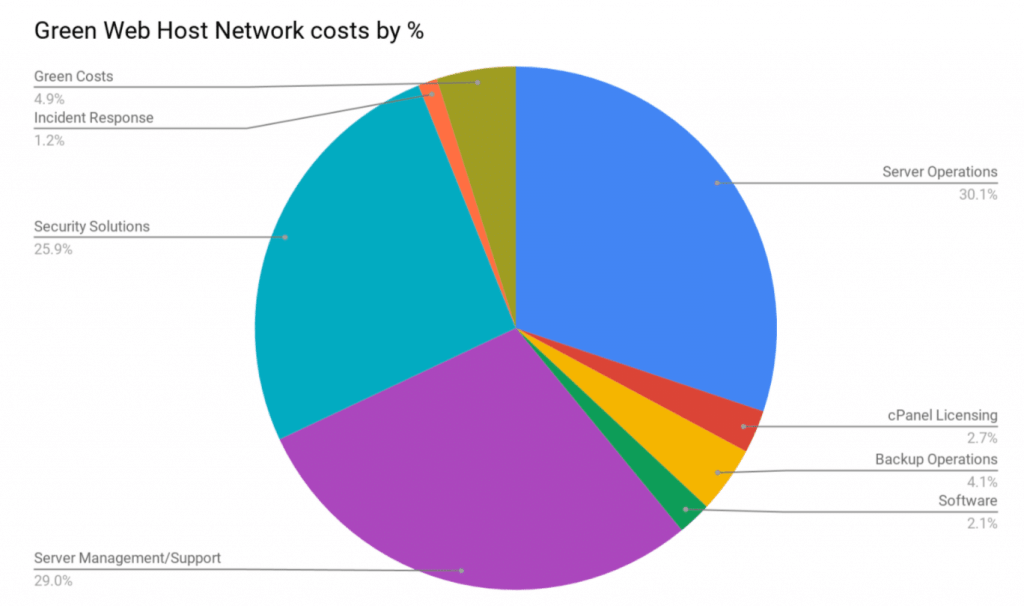
The costs will increase and fluctuate in the coming years based on demand for our services, changes in green costs, and people costs. We will try to minimise any increase in plans or other costs by growing the network further. Domain name costs are subject to currency fluctuations and changes from the regulator/wholesaler.
Choose your web hosting wisely
Choosing the right web hosting in Australia doesn’t have to be painful. Using the tips we’ve outlined above, you can continue your research with clarity. We are passionate about helping small businesses grow, and having a reliable, credible, ethical web host is a big part of that!
If you’re committed to making ethical business decisions and want to grow your business while also reducing your carbon footprint, our Green Web Hosting packages might be the right fit for you. Sustainability and ethical living are more than a fad to us – we walk the talk and want to help more small businesses do the same!
Drop us a line so we can discover how our services can help you grow your business more sustainably today.
